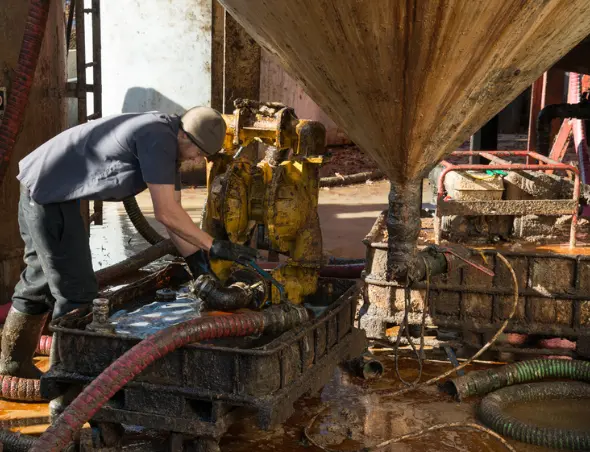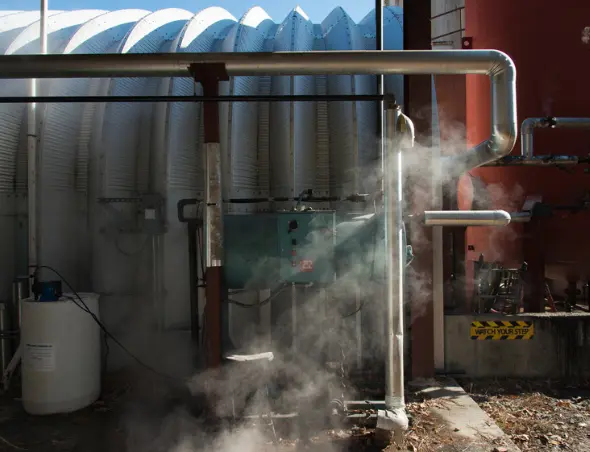Preventative Drain Jetting for Restaurants
Let’s talk about the nightmare scenario. It’s a packed Saturday night, orders are flying, and suddenly water is backing up from every floor drain. Your kitchen floods, you shut down for the weekend, and you watch tens of thousands of dollars in revenue circle the drain along with the foul smelling water.
I’ve seen it happen to the best restaurants, and it’s almost always preventable. You’re here because you know the cheap fixes don’t last and you can’t afford to gamble with emergency shutdowns. You need a real solution. This is it.



★★★★★ 5.0
from 100+ reviews

Technician operating specialized FOG separation equipment to process and transfer recovered fats, oils, and grease into valuable renewable resources.
★★★★★
Greasecycle is always reliable and very responsive whenever we call the office. We switched services from our prior vendor over 5 years ago and never looked back!
★★★★★
This is one of the best companies I’ve ever worked for. They really care about their clients and the staff is acts more like family than employees.
★★★★★
I’ve worked at multiple restaurants in the Cary area and we ALWAYS use Greasecycle. Their drivers are the best and we never even have to call for a pick up. I totally recommend them
What is Drain Jetting? (And Why Snaking is a Waste of Your Money)
In simple terms, brown grease is the thick, heavy mixture that builds Let’s get straight to the point. A plumber’s snake just punches a temporary hole through a grease clog. It leaves layers of hardened grease, soap, and food waste clinging to the pipe walls, guaranteeing that clog will come back.
Drain jetting, or hydro jetting, is the professional solution. We use a specialized hose and nozzle to blast water at over 4,000 PSI inside your pipes. This doesn’t just poke the clog; it scours the entire pipe wall clean, stripping away years of buildup and restoring the line to its original capacity. It’s the difference between a temporary fix and a long-term solution.

Industrial grease processing facility with steam venting from advanced separation equipment that recovers valuable materials from restaurant waste streams.
2,000+
Restauraunts Served
23M+
Gallons of UCO Recycled
80,239
Tons of Co2 Saved
How My Team Protects Your Kitchen: The Jetting Process
When you work with us, you get a precise, professional process; not a guy with a pressure washer. We’ve refined this method in hundreds of the busiest kitchens to guarantee results with zero disruption.
1) Walk through & Access
First, we map your lines and locate the proper clean outs. We protect your floors and equipment before any work begins.
2) High Pressure Jetting
We run the jet from upstream to downstream. This is critical; it ensures all the grease and debris is forced toward the grease trap, not back up into your kitchen sinks. We match the pressure and nozzle type to your pipe material, cleaning it thoroughly without causing damage.
3) Rinse & Test
After the jetting, we flush the system and test the flow from every fixture. We’ll also note any potential issues we detect in the line, like roots or breaks, so you’re aware of them before they become a crisis.
4) Inspector Ready Paperwork
You get a simple Drain Jetting Report with the date, lines cleaned, findings, and before/after photos. It’s clean, professional documentation your health inspector will love to see.

Stop Losing Money to Inadequate Grease Management
We’ll respond ASAP.
How Often Should We Jet? (Straight forward Guideline)
Every kitchen is different based on menu, volume, and staff habits. A 24/7 diner frying bacon all day needs more frequent service than a small café. Here’s a simple rule of thumb I’ve developed over the years:
Important: We align your jetting with your grease trap pumping schedule. This integrated approach ensures your entire FOG management system works together, which is the key to preventing 99% of emergencies.
| Kitchen Type | Recommended Frequency | Why This Schedule Works |
|---|---|---|
| Heavy Fry/Grill or 16+ Hours/Day | Monthly to 6 Weekly | Prevents heavy grease from hardening into concrete like blockages. |
| Typical Full Service Restaurant | Every 2–3 Months | Keeps pace with standard FOG buildup to eliminate slow drains during peak hours. |
| Light Café / Quick Serve | Quarterly | A cost effective cadence that stops seasonal buildup before it causes odors or backups. |

Industrial grease processing facility with steam venting from advanced separation equipment that recovers valuable materials from restaurant waste streams.
The Real Cost: Emergency Call vs. Smart Prevention
Waiting for a clog is the most expensive decision you can make. Let’s look at the real numbers.
- The Emergency: A weekend shutdown easily costs $10,000+ in lost revenue. Add $2,000+ for the emergency plumber, potential health code fines, and damage to your reputation. One backup can cost you over $15,000.
- The Prevention Plan: A scheduled preventative jetting service is a tiny fraction of that cost. You get a predictable, budgeted expense that completely eliminates the risk of a disastrous backup.
This isn’t an expense; it’s the highest ROI insurance policy you can buy for your restaurant. It’s how the most successful restaurant groups in the country operate without interruption.
Frequently Asked
Frequently asked questions
Will jetting damage my pipes?
No. We train our technicians to match the water pressure and nozzle angle to your specific pipe material and condition. It’s a precise science that cleans effectively without risking your infrastructure.
Do inspectors ask for jetting logs?
Inspectors primarily check your grease trap manifests, but providing a professional jetting report shows them you are proactive about your entire drainage system. It demonstrates a higher level of care and can make inspections go much smoother.
Is snaking enough for a restaurant?
Absolutely not. Snaking just pokes a hole, which is why your clogs keep coming back. Jetting scours the entire pipe clean, which is the only way to actually prevent future clogs.
Do you use harsh chemicals?
Never. We only use high pressure water. Harsh chemicals can damage your pipes and the environment, and they don’t solve the root cause of grease buildup.

Ready to move forward?
Book a pickup or delivery slot. Upload tickets.
